How to Ensure a Balanced Diet for Different Parrot Species
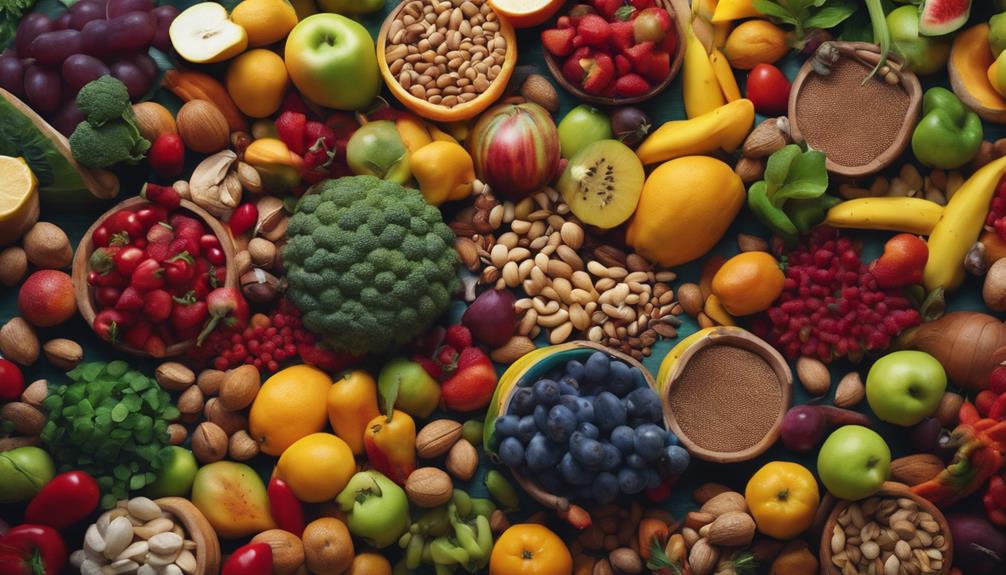
Balanced Diet for Different Parrot Species:
- Research each species: Understand the specific dietary requirements of different parrot species.
- Variety is key: Offer a diverse range of fruits, vegetables, seeds, pellets, and nuts to meet nutritional needs.
- Consult a vet: Seek advice from an avian veterinarian to create a tailored diet plan for your parrot.
- Monitor food intake: Keep track of what your parrot eats to ensure they are getting a balanced diet.
- Treats in moderation: Limit high-fat and sugary treats to prevent nutritional imbalances.
- Fresh water: Provide clean, fresh water daily to keep your parrot hydrated and healthy.
- Regular check-ups: Schedule regular vet check-ups to monitor your parrot's overall health and dietary needs.
Understanding Parrot Species' Nutritional Needs
Understanding the nutritional needs of different parrot species is essential for maintaining their health and well-being in captivity. Parrots exhibit a diverse range of feeding habits influenced by their natural environments. For example, macaws are known to consume a diet rich in nuts and fruits, while lorikeets have a preference for nectar and pollen. These dietary preferences aren't merely based on taste but are crucial for meeting their specific nutritional requirements.
Failure to provide a balanced diet that aligns with a parrot species' natural feeding habits can lead to various health implications. Malnutrition, obesity, and vitamin deficiencies are common issues that arise when parrots aren't fed appropriately. Therefore, it's imperative for caretakers to be knowledgeable about the dietary needs of the specific parrot species they're caring for to ensure their optimal health and longevity in captivity.
Importance of Variety in Parrot Diets

Parrots require a diverse range of nutrients to maintain optimal health and well-being. Introducing a variety of foods in their diet can offer essential vitamins, minerals, and antioxidants crucial for their physiological functions.
Furthermore, a varied diet can stimulate natural foraging behaviors, promoting mental and physical enrichment in these intelligent birds.
Nutritional Needs Diversity
A diverse range of nutrients in a parrot's diet is essential to support their overall health and well-being. Parrots require a variety of vitamins, minerals, proteins, and carbohydrates to thrive.
Nutritional supplements can be beneficial in meeting specific dietary requirements, especially for parrots with dietary restrictions or those recovering from illnesses. Ensuring optimal digestive health is crucial for parrots, and a diverse diet can aid in maintaining a healthy gut flora.
Feeding schedules should be consistent and provide a mix of fresh fruits, vegetables, seeds, and pellets to offer a well-rounded nutrition plan. By incorporating a diverse range of nutrients into their diet, parrot owners can help promote longevity and vitality in their feathered companions.
Health Benefits of Variety
To maintain optimal health and well-being in parrots, a varied diet rich in essential nutrients is crucial for supporting their overall physiological functions and longevity. Providing flavorful options that cater to their dietary preferences is not only enjoyable for the birds but also essential for their nutrient absorption and digestive health. Including a variety of foods in a parrot's diet ensures they receive a wide range of vitamins, minerals, and macronutrients necessary for their well-being. Different foods offer unique benefits, and by offering a diverse selection, owners can help prevent nutrient deficiencies and promote a healthy digestive system. A balanced diet contributes to a parrot's overall health, happiness, and longevity.
| Benefits of Variety in Parrot Diets | |
|---|---|
| 1. Supports Nutrient Absorption | 3. Promotes Digestive Health |
| 2. Catering to Dietary Preferences | 4. Ensures Balanced Nutrition |
Behavioral Enrichment Through Diet
How does incorporating a diverse range of foods into a parrot's diet contribute to behavioral enrichment and overall well-being?
Providing various foods for parrots not only meets their dietary preferences but also enhances their mental and physical health. By offering a variety of foods, parrots can engage in natural feeding behaviors, leading to improved cognitive stimulation and overall well-being.
This can be achieved through:
- Foraging opportunities: Different textures and types of food encourage natural foraging behaviors.
- Nutritional puzzles: Introducing food in different ways, such as hidden or in toys, stimulates problem-solving skills.
- Feeding behaviors: Observing parrots interact with different foods can provide valuable insights into their preferences and behaviors.
- Dietary preferences: Offering a range of foods allows parrots to select their preferred items, promoting a balanced diet based on their choices.
Tailoring Diets to Parrot Species
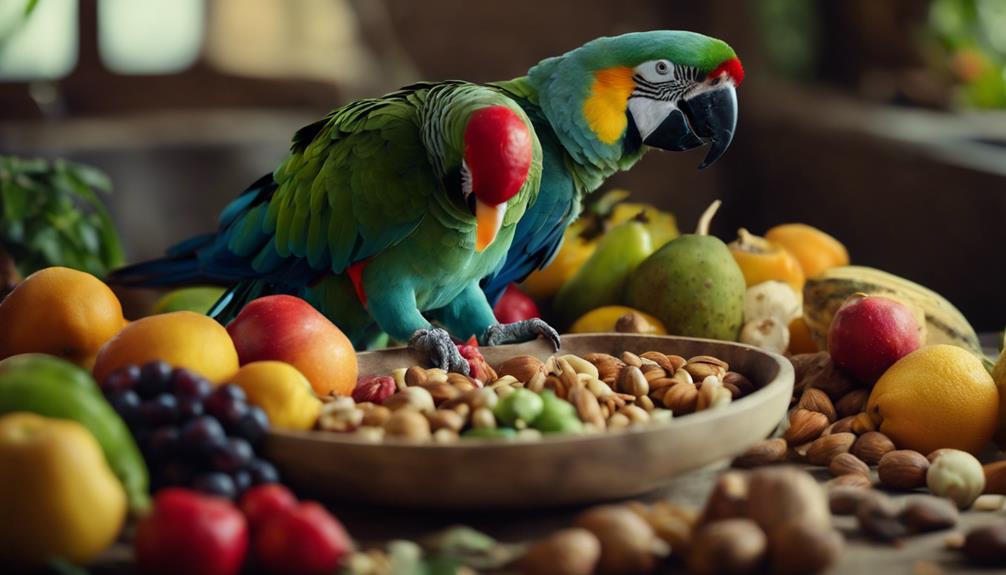
Tailoring diets for different parrot species involves meticulous consideration of their unique nutritional requirements and feeding behaviors. Customized feeding plans are essential to ensure species-specific nutrition, promoting the overall health and well-being of the birds. Parrots vary greatly in their dietary needs based on factors such as size, activity level, and natural habitat. Below is a table highlighting some key dietary considerations for popular parrot species:
| Parrot Species | Preferred Diet |
|---|---|
| Macaws | High-quality pellets, fresh fruits, nuts |
| Cockatiels | Pellets, leafy greens, vegetables, seeds |
| African Greys | Pellets, nuts, fruits, vegetables |
Each species has its preferences and requirements, necessitating a tailored approach to their nutrition. Macaws, for instance, thrive on a diet rich in nuts and fruits due to their large size and high energy levels. Cockatiels, on the other hand, benefit from a varied diet that includes seeds, leafy greens, and vegetables. African Greys require a balanced mix of pellets, nuts, fruits, and vegetables to meet their nutritional needs adequately. By customizing diets based on species-specific nutrition, parrot owners can ensure their feathered companions enjoy a healthy and balanced diet.
Common Nutritional Deficiencies in Parrots
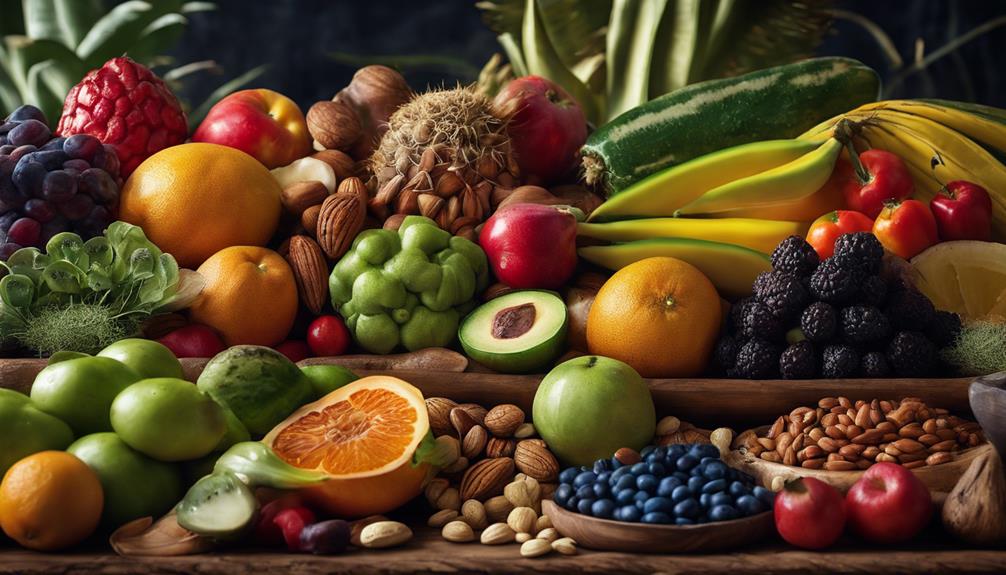
Parrots are susceptible to common nutritional deficiencies that can impact their health and well-being. Understanding the key nutrient sources, recognizing signs of deficiency, and implementing dietary enrichment tips are crucial aspects in maintaining a balanced diet for these birds.
Proper nutrition plays a vital role in preventing deficiencies and ensuring the overall health of parrot species.
Key Nutrient Sources
To ensure optimal health and well-being for parrot species, it's crucial to provide key nutrient sources that address common nutritional deficiencies in these birds. Achieving proper nutrient balance can be done through a variety of protein and vitamin sources.
Some essential nutrient sources for parrots include:
- Pelleted Diets: These provide a balanced mix of nutrients, including proteins and vitamins, ensuring your parrot receives all the necessary elements for good health.
- Fresh Fruits and Vegetables: Rich in vitamins and antioxidants, these foods can supplement a parrot's diet with essential nutrients.
- Nuts and Seeds: Good sources of healthy fats, proteins, and certain vitamins crucial for a parrot's overall well-being.
- Commercial Vitamin Supplements: These can be added to the diet to ensure any potential deficiencies are addressed promptly, supporting the bird's health.
Signs of Deficiency
Observing the behavior and physical symptoms of parrots can help identify common nutritional deficiencies in these birds. Symptoms like feather abnormalities, weight loss, lethargy, and changes in droppings may indicate issues with nutrient balance.
For instance, a lack of Vitamin A can lead to respiratory problems and poor skin condition, while a deficiency in calcium can result in egg-laying complications and bone disorders. By recognizing these signs early on, dietary adjustments can be made to address the deficiencies and improve the overall health of the parrot.
Providing a well-rounded diet with a variety of fresh fruits, vegetables, pellets, seeds, and occasional supplements can help prevent these deficiencies and promote the well-being of the bird.
Dietary Enrichment Tips
Early detection of common nutritional deficiencies in parrots is crucial for implementing dietary enrichment strategies that can optimize their health and well-being. To address these deficiencies effectively, consider the following tips:
- Enrichment Activities: Engage parrots in a variety of activities that stimulate their physical and mental health, such as puzzle feeders or rotating toys.
- Dietary Supplements: Consult with a veterinarian to determine if specific supplements are necessary based on the parrot's diet and health status.
- Foraging Opportunities: Encourage natural foraging behaviors by hiding treats or food items in different locations within their enclosure.
- Interactive Toys: Provide toys that require problem-solving skills and physical interaction to keep the parrot mentally engaged and active.
Feeding Guidelines for Parrot Health
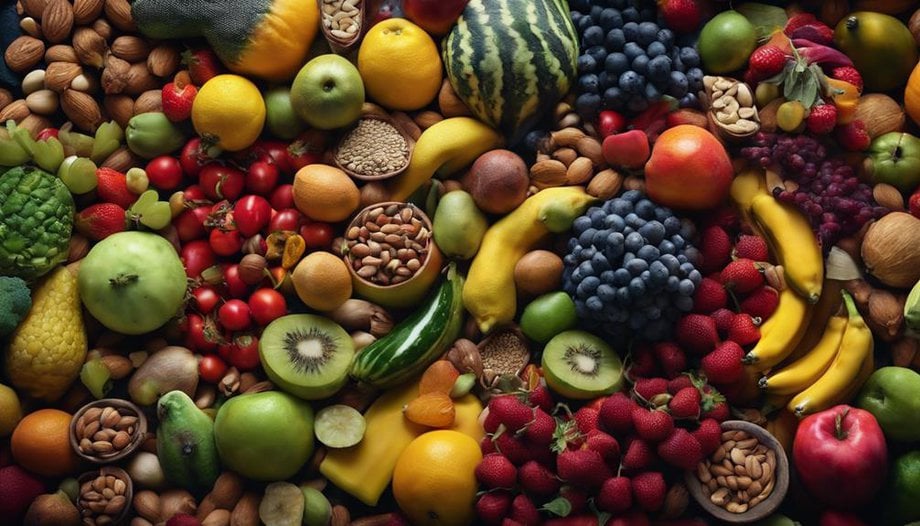
When considering the feeding guidelines for optimal health in parrots, a well-balanced diet is crucial to support their nutritional needs and overall well-being. Meal planning plays a vital role in ensuring that parrots receive the necessary nutrients for their physiological functions. It's essential to offer a variety of foods to maintain a nutritional balance in their diet. Parrots should be provided with a mix of fruits, vegetables, seeds, nuts, and pellets to meet their dietary requirements.
Nutritional balance is achieved by incorporating a wide range of foods to supply essential vitamins, minerals, proteins, and carbohydrates. Meal planning should include a rotation of different food items to prevent nutrient deficiencies and offer enrichment through varied tastes and textures. Understanding a parrot's specific species and individual preferences is key to tailoring their diet accordingly. By following these feeding guidelines, caregivers can promote the health and well-being of their parrot companions.
Avoiding Harmful Foods for Parrots
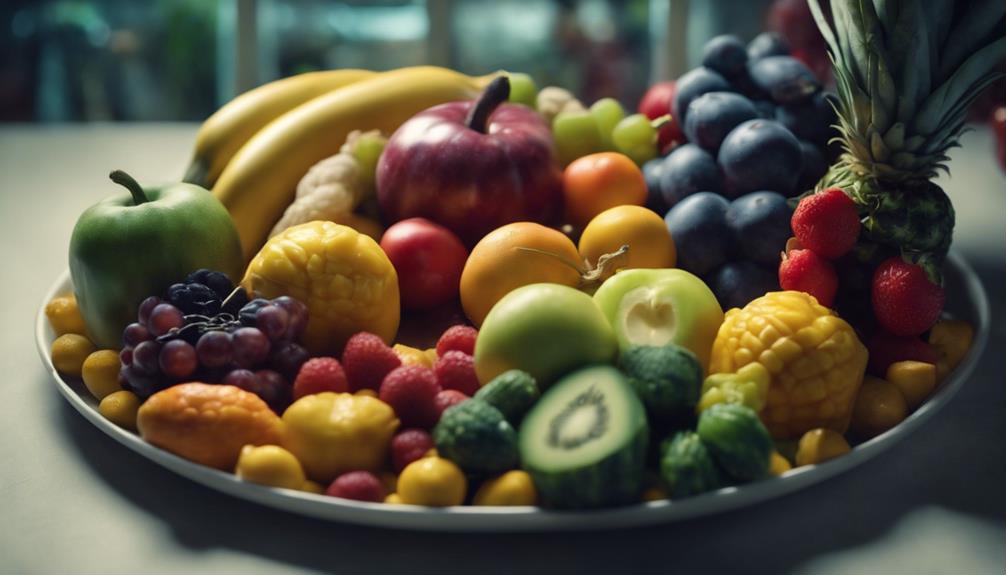
To maintain optimal health in parrots, it's crucial to be aware of the harmful foods that should be avoided in their diet. Parrots have sensitive digestive systems, making it important to steer clear of toxic foods that can jeopardize their well-being.
Some common harmful foods for parrots include:
- Avocado: Contains a toxin called persin, which is harmful to birds.
- Chocolate: Contains theobromine, which is toxic to parrots.
- High-fat or high-sugar snacks: Can lead to obesity and other health issues.
- Alcohol: Even small amounts can be extremely dangerous for parrots.
Instead of offering these risky foods, consider safe treats for parrots such as fresh fruits like apples, berries, and melons, or vegetables like carrots and bell peppers. Providing a balanced diet rich in nutrients and avoiding toxic foods will help ensure your parrot's health and longevity.
Consultation With Avian Veterinarians
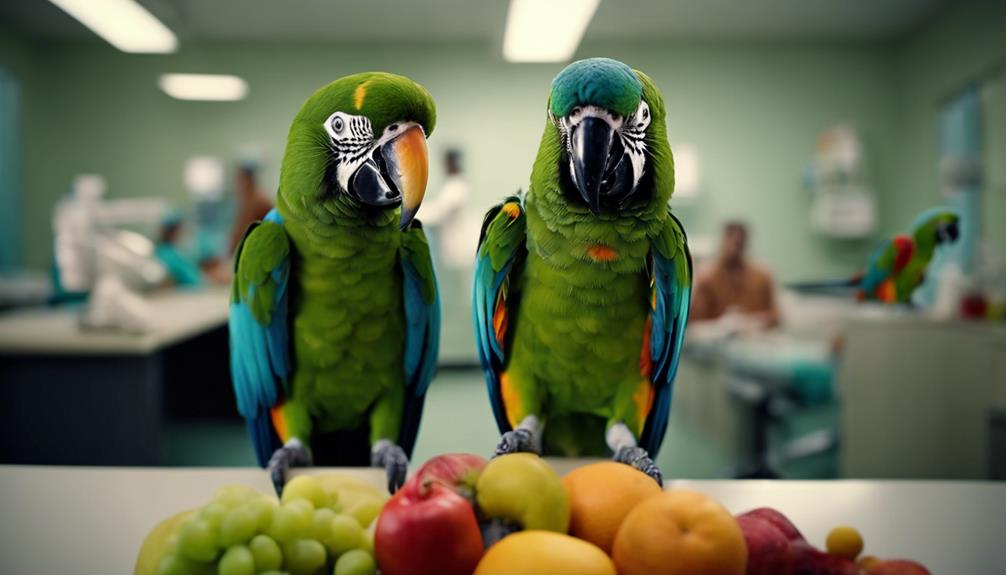
Consulting with avian veterinarians is essential for ensuring the optimal health and well-being of parrots through professional guidance and specialized care. Avian veterinarians possess the expertise to recommend suitable dietary supplements and provide advice on recommended brands tailored to the specific needs of different parrot species. They can offer valuable insights into the nutritional balance required for parrots, ensuring that homemade recipes meet essential dietary requirements.
When consulting with avian veterinarians, parrot owners can gain access to a wealth of knowledge on creating balanced diets that cater to their birds' individual health requirements. These professionals can offer guidance on the inclusion of essential nutrients and vitamins, as well as recommend reputable brands for commercial parrot foods and dietary supplements. By working closely with avian veterinarians, parrot owners can ensure that their feathered companions receive the necessary care and attention to maintain optimal health and longevity.
Frequently Asked Questions
Can Parrots Eat Spicy Foods Like Chili Peppers or Hot Sauces?
Parrots should avoid spicy foods like chili peppers or hot sauces due to potential harm to their health. These items can irritate their digestive system and may cause discomfort. It's crucial to prioritize parrot taste preferences for their well-being.
How Often Should I Offer Treats or Snacks to My Parrot?
When offering treats or snacks to a parrot, it's important to consider training strategies and reinforcement techniques to maintain a balanced diet. Nutritional analysis and portion control are crucial factors to ensure the bird's overall health.
Are There Any Specific Dietary Considerations for Parrots With Allergies or Sensitivities?
When managing allergies in parrots, dietary modifications are key. Sensitivity testing helps identify triggers. Nutritional alternatives can meet their needs. Balancing nutrients is crucial. Consult a vet for tailored advice on parrot diets with allergies or sensitivities.
Can Parrots Safely Consume Fruits and Vegetables That Have Been Treated With Pesticides?
Ever wondered if parrots should feast on fruits and veggies drenched in pesticides? Organic produce is the way to go. Pesticide residues pose health risks to these colorful birds. Safety concerns demand a switch for their well-being.
How Can I Ensure My Parrot Is Getting Enough Hydration in Their Diet?
To ensure proper hydration levels for a parrot, focus on water consumption by providing fresh, clean water daily. Incorporate moisture in the diet through foods like fruits and vegetables. Monitor fluid intake to maintain optimal health.











